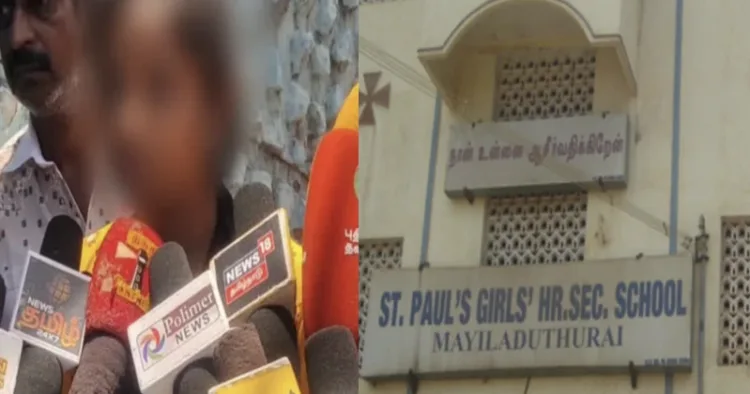St. Paul’s Girls’ Higher Secondary School in Mayiladuthurai, Tamil Nadu, has come under scrutiny for allegedly compelling students to perform cleaning duties as part of their school routine. Reports indicate that students, upon returning for the new academic year with hopes of a fresh start, were instead tasked with cleaning classrooms, watering mud floors and gardens, sweeping with brooms, mopping, and even cleaning toilets using harmful acids and chemicals.
The issue gained attention when a ninth-grade student reportedly refused to comply with these tasks and was allegedly slapped by a teacher as a consequence. This incident has sparked outrage among parents and the public, who argue that such duties are not only inappropriate but also detract from the primary purpose of schooling — education.
Despite warnings and censure from government authorities in the past regarding such practices, there appears to be persistence in certain institutions. Critics emphasise that schools, which often charge substantial fees, should allocate resources to hire dedicated cleaning staff rather than burdening students with menial chores.
Authorities are expected to investigate the matter further to ensure that students are provided with a safe and conducive learning environment without being subjected to non-academic tasks.
This incident has reignited discussions about the responsibilities and rights of students in schools and the appropriate roles of teachers in maintaining discipline.
Upon returning home, the girl promptly informed her parents about the incident. The following day, her parents visited the school to address the matter with the administration. However, the meeting reportedly escalated into a heated exchange as the parents expressed their displeasure over their daughter being asked to perform cleaning tasks instead of focusing on her studies.
Feeling that their concerns were not adequately addressed and disapproving of the school’s disciplinary approach, the parents decided to withdraw their daughter from St. Paul’s Girls’ Higher Secondary School. They stated their intention to enroll her in a different institution, citing concerns about the treatment of female students and the school’s alleged intimidation tactics under the guise of discipline.
ஒழுக்கம் என்ற பெயரில் கொடுமைப்படுத்துவதா..? வகுப்பறையை கூட்டாததால் மாணவியை ஆசிரியர் அடித்ததாக குற்றச்சாட்டு.. T.C.ஐ பெற்று சென்ற பெற்றோர் #Polimer | #Mayiladuthurai | #SchoolStudent | #Attack | #Student | #PolimerNews pic.twitter.com/zbf5ERU00q
— Polimer News (@polimernews) June 11, 2024
She reported that upon the school bell ringing at 4:30 PM, a teacher instructed her to sweep the classroom. Despite explaining that she needed to catch her van home, she was allegedly slapped on the cheek by the teacher, who chastised her for perceived arrogance.
In Christian-managed, government-aided schools, students are reportedly prohibited from wearing religious symbols such as marks on their foreheads, flowers in their hair, bangles, sacred threads, Rudraksha beads, anklets, and other items deemed contrary to Christian beliefs.
Meanwhile, in Theethipalayam village, Coimbatore, students faced an unusual predicament due to insufficient classrooms at a government secondary school. The shortage has resulted in declining admissions, highlighting ongoing challenges in infrastructure development for education institutions in rural areas.
Due to ongoing construction at the school, authorities have directed new students to attend nearby schools. This shortage of facilities has also affected existing students in classes 8 and 9, totaling around 100, who now find themselves without adequate classrooms.
In response, makeshift arrangements have been made under the open sky, including seating students under trees and in the two-wheeler parking area. Despite occasional drizzles brought by the Southwest monsoon, classes continue in these temporary settings, raising concerns about student welfare and the quality of education provided.
This situation draws parallels to historical educational practices such as Thinnai schools, where classes were conducted on raised platforms in front of houses, and the Gurukul system, where learning often took place under trees, highlighting the challenges faced by students and educators alike in adapting to current circumstances.
'வகுப்பறை இல்லாமல் வெளியில் அமர்ந்து படிக்கும் மாணவர்கள்' – அரசுப்பள்ளியின் அவல நிலை | Govt School#Coimbatore #GovtSchool #Classrooms #news18tamilnadu #students #tamilnews pic.twitter.com/ITZdL7Tb6n
— News18 Tamil Nadu (@News18TamilNadu) June 12, 2024
A concerned parent expressed worries about students sitting outdoors under trees, citing concerns about potential harm from reptiles or insects and the inevitability of bird droppings soiling their clothes. They highlighted the distractions caused by noise and the need for daily cleaning of their attire to remove dirt or stains, which worsens during rainy weather.
Located in Theethipalayam village, which houses approximately 10,000 residents, the government schools serve nearly 500 students. Despite being upgraded to include classes up to the 12th grade four years ago, the school faces a critical shortage of classrooms. This shortfall has created less-than-ideal learning conditions for students, posing challenges to their education.
Tamil Nadu Chief Minister M K Stalin recently asserted on his social media platform that under the three-year tenure of the DMK government, there has been a remarkable transformation in the state’s educational infrastructure. He emphasized significant strides akin to a cheetah’s four-legged leaps, highlighting a quantum jump in the sector.
Stalin detailed initiatives aimed at enhancing technological integration in education, including the provision of internet connectivity to 20,332 state-run schools. Furthermore, the government has invested Rs 519.73 crore in establishing high-tech labs and Rs 455.32 crore in setting up 22,931 smart classrooms across Tamil Nadu.
#DravidianModel அரசின் மூன்றே ஆண்டுகளில் தமிழ்நாட்டின் கல்வித்துறை கண்டுள்ள நாலுகால் பாய்ச்சல் வளர்ச்சிக்கு இன்றைய செய்தித்தாள்களில் வந்துள்ள செய்திகளே சாட்சி!
20,332 அரசு – அரசு உதவி பெறும் பள்ளிகளில் இணைய வசதி,
519.73 கோடி ரூபாயில் உயர்தொழில்நுட்பத்துடன் கூடிய ஆய்வகங்கள்,… pic.twitter.com/Pn4aGrWlUw
— M.K.Stalin – தமிழ்நாட்டை தலைகுனிய விடமாட்டேன் (@mkstalin) May 31, 2024
The lack of classrooms poses a challenge to Stalin’s efforts to boost enrolment rates in government schools.















Comments